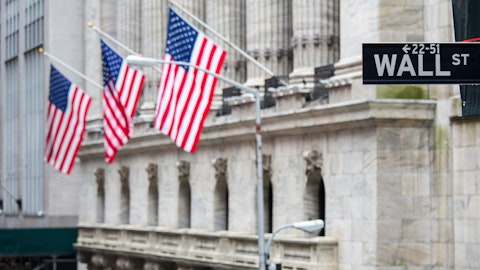Cyclical stocks are shares of companies whose performance is heavily dependent on business cycles and economic conditions. These stocks represent industries that produce non-essential, or discretionary, goods and services, such as automobiles, housing, entertainment, travel, and retail.
As the Federal Reserve lowers interest rates, it creates a favorable environment for investing in cyclical stocks. Lower interest rates reduce the cost of borrowing, which encourages both consumers and businesses to take out loans and spend more. This boost in consumer spending is particularly beneficial for companies that sell discretionary goods and services, such as those in the automotive, housing, travel, and retail sectors.
According to the latest report, released by the U.S. Bureau of Economic Analysis (BEA) on September 27, personal income in the US increased by $50.5 billion, or 0.2%, in August. This growth was driven by an increase in compensation, which was partially offset by a decrease in personal income receipts on assets. Disposable personal income (DPI), which is personal income less personal current taxes, also increased by $34.2 billion, or 0.2%. Additionally, personal consumption expenditures (PCE) rose by $47.2 billion, or 0.2%, with a $54.8 billion increase in spending for services and a $7.6 billion decrease in spending for goods.
Large Bank Sees Stabilizing Economy Boosting Cyclical Stocks
On October 14, CNBC reported that Morgan Stanley is optimistic about the stabilizing economy and its potential to boost cyclical stocks. According to equity strategist Michael Wilson, the recent rise in yields following optimistic economic data, including the latest wholesale inflation report, could indicate that the bond market is beginning to part with some of the growth concerns on the hope that the economy is on stable footing. He added that this trend provides greater confidence in cyclical stocks, which are positively correlated to upward moves in the 10-year Treasury yield. Wilson expects both rates and economic data to support cyclical stocks. The bank’s bullish call comes as the S&P 500 rose to a fresh record high, supported by better-than-expected results from a handful of companies that have reported third-quarter results.
Cyclical stocks offer significant opportunities for investors looking to capitalize on economic growth and favorable monetary policy. As the Federal Reserve continues to lower interest rates, the reduced borrowing costs will continue to stimulate consumer and business spending, driving demand for discretionary goods and services. With that in context let’s take a look at the 7 best consumer cyclical stocks to buy according to hedge funds.

Aerial view of a shopping mall bustling with consumers.
Our Methodology
To compile our list of the 7 best consumer cyclical stocks to buy according to hedge funds, we used the Finviz and Yahoo stock screeners to find the largest consumer cyclical companies. We then narrowed our choices to 7 stocks according to their hedge fund sentiment, which was taken from our database of 912 elite hedge funds as of Q2 of 2024. The list is sorted in ascending order of their hedge fund sentiment, as of the second quarter.
Why do we care about what hedge funds do? The reason is simple: our research has shown that we can outperform the market by imitating the top stock picks of the best hedge funds. Our quarterly newsletter’s strategy selects 14 small-cap and large-cap stocks every quarter and has returned 275% since May 2014, beating its benchmark by 150 percentage points (see more details here).
7 Best Consumer Cyclical Stocks To Buy According to Hedge Funds
7. MercadoLibre, Inc. (NASDAQ:MELI)
Number of Hedge Fund Investors: 84
MercadoLibre, Inc. (NASDAQ:MELI) is one of the largest e-commerce and fintech companies in Latin America, often dubbed the “Amazon of Latin America.” The company operates online marketplaces across several countries, including Argentina, Brazil, and Mexico. MercadoLibre, Inc. (NASDAQ:MELI) also has a strong fintech division, Mercado Pago, which offers payment solutions and digital wallets. The company’s logistics arm, Mercado Envios, provides seamless delivery services.
On August 1, MercadoLibre, Inc. (NASDAQ:MELI) reported strong results, exceeding market expectations, for the quarter ended June 30. The company’s revenue increased by 41.5% year-over-year to $5.07 billion, driven by a 19% and 29% year-over-year increase in unique buyers and items sold respectively. Brazil posted the fastest growth on both measures which led to GMV growth accelerating to 36% year over year. Mexico had a growth of 30% year over year and Argentina’s GMV growth improved to 252% year over year.
MercadoLibre, Inc.’s (NASDAQ:MELI) fintech segments also reported impressive growth in Brazilian and Mexican markets. The company’s fintech segment generated a revenue of $2.10 billion, compared to $1.64 billion for the same quarter in the previous year. The company’s Fintech Monthly Active users (MAU) surpassed 50 million for the first time, with growth of 37% YoY. Brazil delivered the highest MAU growth at 46% YoY. MercadoLibre, Inc. (NASDAQ:MELI) is the largest loan fintech in Mexico and is planning to apply for a banking license to expand its operations.
MercadoLibre, Inc. (NASDAQ:MELI) is forecasted to report 62.66% earnings growth for this year. Industry analysts are bullish on the company’s stock price and have a consensus Buy rating at a target price of $2,350.11, which implies a 12.68% increase from its current level.
6. Tesla, Inc. (NASDAQ:TSLA)
Number of Hedge Fund Investors: 85
Tesla, Inc. (NASDAQ:TSLA) is the global leader in electric vehicle manufacturing and has disrupted the automotive industry with its electric cars. Tesla, Inc.’s (NASDAQ:TSLA) innovation also extends into robotics and autonomous driving technology with its Full Self-Driving (FSD) software.
On October 10, Tesla, Inc.’s (NASDAQ:TSLA) CEO Elon Musk revealed the company’s humanoid robot, Optimus, which is expected to cost around $10,000 to produce and will be priced at $20,000 for customers. One of the most significant advantages Tesla, Inc.(NASDAQ:TSLA) has in the humanoid robot market is its ability to leverage its existing technology and manufacturing capabilities to keep costs low. The company has already developed advanced AI and robotics technology for its electric vehicles, which can be easily transferred to Optimus. Additionally, the company’s large-scale manufacturing capabilities will enable the company to produce Optimus at a lower cost than its competitors.
According to a report by Markets and Markets, the humanoid robot market is valued at $2.03 billion in 2024 and is projected to grow to $13.25 billion by 2029, at a CAGR of 45.5%. Tesla, Inc. (NASDAQ:TSLA) is well-positioned to capture a significant share of the humanoid robot market. With its affordable pricing and advanced technology, Optimus is likely to disrupt various industries, including manufacturing, healthcare, and education.
5. The Home Depot, Inc. (NYSE:HD)
Number of Hedge Fund Investors: 86
The Home Depot, Inc. (NYSE:HD) is the largest home improvement retailer in the U.S. The company provides a wide range of products, from construction materials and tools to home appliances and garden equipment. The company has over 2,300 stores across North America that serve both professional contractors and DIY customers.
The Home Depot, Inc.’s (NYSE:HD) growth potential is driven by its focus on expanding the Pro market, which is estimated to be a $1 trillion addressable market. The company’s Pro Market refers to the segment of its business that focuses on professional contractors and builders. Home Depot (NYSE:HD) is accelerating its investments in this area. In June, The Home Depot, Inc. (NYSE:HD) also acquired SRS Distribution (SRS) for $18.25 billion, which is expected to boost the company’s market share in the Pro market and drive long-term growth.
The Home Depot, Inc.’s (NYSE:HD) sales have been impacted by the recent slowdown in the housing market, which has resulted in a decline in demand for home improvement and refurbishing projects. However, with the Federal Reserve’s recent decision to lower interest rates, the company is poised to benefit from a potential rebound in the housing market. The decline in interest rates is expected to boost housing sales, which will in turn drive demand for The Home Depot, Inc.’s (NYSE:HD) products and services. Additionally, the company’s strategic shift towards smaller repair and maintenance projects, as well as its growing focus on servicing professional customers, will help mitigate the impact of the housing market slowdown.
4. PDD Holdings Inc. (NASDAQ:PDD)
Number of Hedge Fund Investors: 86
PDD Holdings Inc. (NASDAQ:PDD), formerly known as Pinduoduo, is a Chinese e-commerce platform founded in 2015. The company is known for its unique “social commerce” model, which encourages group buying and social sharing to unlock discounts.
One of the most promising aspects of PDD Holdings Inc.’s (NASDAQ:PDD) business is its ownership of the online marketplace Temu, which is rapidly expanding in Europe and North America and has the potential to become one of the world’s most popular online shopping destinations. PDD Holdings Inc.’s (NASDAQ:PDD) growth is driven by its ability to aggregate large groups of buyers to negotiate lower prices from suppliers, passing the savings on to its users. This model has proven to be highly effective. As the company continues to expand its user base and cross-border business, it is well-positioned to maintain its growth momentum.
On August 26, PDD Holdings Inc. (NASDAQ:PDD) reported that its revenue surged by 86% year-over-year to $13.35 billion for the quarter ended on June 30. However, the revenue fell short of consensus estimates of $14.04 billion. This shortfall in revenues was due to an increase in operating expenses, which ballooned by 48% year-over-year to $4.23 billion. The rise in operating expenses was driven by increased investments in marketing, advertising, and promotions to attract shoppers.
PDD Holdings Inc.’s (NASDAQ:PDD) lower-than-expected revenues were due to high unemployment rates in China’s economy which has led consumers to reduce spending and negatively impacted the country’s retail and e-commerce companies. However, sales growth is expected to recover, due to significant stimulus in China which aims to boost economic growth and consumer spending. In their Q2, investment letter, Hayden Capital, an investment management firm, stated the following regarding PDD Holdings Inc. (NASDAQ:PDD):
“A few weeks ago, Latepost (a leading Chinese technology news outlet) confirmed Pinduoduo’s online grocery initiative is solidly profitable (LINK). According to the article, Duoduo Grocery is able to achieve ~5% net profit margins in competitive markets (where they go up against Meituan Select). In non-competitive markets, they can achieve ~10 – 15% net margins. The company doesn’t disclose the exact scale of Duoduo Grocery, but our calculations indicate it’s likely around ~RMB 300BN this year, and still growing in the double-digits. At that level, the division is likely contributing ~US $2.5BN in annual profits17. It’s an impressive result, but admittedly, not a huge needle-mover in light of the total $17.6BN net profits the company is expected to make this year (~14% of overall profits).
From a valuation perspective, PDD Holdings Inc. (NASDAQ:PDD) is trading at attractive levels, with a forward price-to-earnings ratio of 10.45 as of October 21, representing a nearly 40.19% discount to its sector median of 17.48. Analysts expect a nearly 58.67% increase in PDD Holdings Inc.’s (NASDAQ:PDD) earnings this year. Industry analysts are bullish on the company’s stock price and have a consensus Buy rating at a target price of $167.85, which implies a 29.18% increase from its current level. PDD Holdings Inc. (NASDAQ:PDD) is a compelling investment opportunity for investors looking to capitalize on the growth of the e-commerce industry.
3. Alibaba Group Holding Limited (NYSE:BABA)
Number of Hedge Fund Investors: 91
Alibaba Group Holding Limited (NYSE:BABA) is a Chinese multinational conglomerate specializing in e-commerce, technology, and digital payments. The company operates one of the world’s largest online marketplaces, including Aliexpress, Alibaba, Lazada, Taobao, and Tmall. Alibaba Group Holding Limited (NYSE:BABA) has a diverse business interest in areas such as logistics, digital entertainment, and artificial intelligence. The company is also a leader in cloud computing through Alibaba Cloud.
For the quarter that ended on June 30, Alibaba Group Holding Limited (NYSE:BABA) reported a revenue of $33.47 billion, an increase of 4% year-over-year. The company’s revenue from Cloud Intelligence increased 6% year-over-year to $3.65 billion. Alibaba Group Holding Limited’s (NYSE:BABA) China commerce wholesale business increased 16% to $819 million, whereas revenue from Alibaba Group Holding Limited’s (NYSE:BABA) International Digital Commerce Group (AIDC) grew 32% year-over-year to $4.03 billion.
The strong performance was driven by the growth of cross-border businesses, in particular the Choice business on AliExpress. Industry analysts are bullish on the company’s stock price and have a consensus Buy rating at a target price of $118.33, which implies a 14.40% increase from its current level.
In their Q3 investor letter, Capital Management said the following regarding Alibaba Group Holding Limited (NYSE:BABA):
“Alibaba Group Holding Limited (NYSE:BABA) experienced a massive rebound gaining +47% in the quarter following the announced stimulus program from the Chinese government. As the unexpectedly strong government support was announced, shorts were reversed and any name exposed to China was off to the races. We have long liked Alibaba as the company has continued to trade at a significant discount to its sum-of-the-parts valuation. With most investors writing off Chinese companies entirely, you had an opportunity to invest in a high-quality business at rock bottom prices. Over that time, the company initiated both a dividend (0.9% Yield) and buyback program, repurchasing 9% of shares outstanding over the last twelve months. Despite the strong move in the quarter, the company trades at just 12.4x next-year’s earnings. We see potential for continued multiple expansion as the Chinese economy rebounds and the country becomes investable again.”
2. Booking Holdings Inc. (NASDAQ:BKNG)
Number of Hedge Fund Investors: 96
Booking Holdings Inc. (NASDAQ:BKNG) is a global player in the online travel industry. The company operates in over 220 countries and has a diverse range of brands, including Booking.com, Priceline, Agoda, KAYAK, and OpenTable. Booking Holdings Inc. (NASDAQ:BKNG) provides services for hotel reservations, car rentals, airline tickets, cruise lines, and vacation packages.
Booking Holdings Inc. (NASDAQ:BKNG) has a strong presence in Europe and North America and is expanding its operations in emerging markets. The company operates in a huge and moderately growing market. According to Zion Market Research, the global tourism market size was valued at $11.39 trillion in 2023 and is forecasted to grow to $18.44 trillion by 2032 with a compound annual growth rate (CAGR) of roughly 5.5% between 2024 and 2032.
Booking Holdings Inc. (NASDAQ:BKNG) has over 29 million listings and about 3.4 million properties on its platform. The company is expanding its platform to new geographies and developing new products and services. The company is also investing in technology to improve the user experience and increase efficiency.
In addition, the company has a strong growth outlook, a high-quality business model, and a strong presence that makes it a compelling investment opportunity.
1. Amazon.com, Inc. (NASDAQ:AMZN)
Number of Hedge Fund Investors: 308
Amazon.com, Inc. (NASDAQ:AMZN) is a global leader in e-commerce and cloud computing, offering a broad array of products and services. The company’s Amazon Web Services (AWS) division dominates the cloud infrastructure market, significantly contributing to the company’s profitability. Amazon.com, Inc. (NASDAQ:AMZN) has a diverse business model, which spans e-commerce, logistics, entertainment (through Prime Video), and artificial intelligence (via Alexa).
A major factor in Amazon.com, Inc.’s (NASDAQ:AMZN) growth is its leadership position in the cloud computing sector. The company’s cloud business is poised for continued growth, fueled by the rising adoption of cloud computing and increasing demand for data storage and analytics. Amazon.com, Inc. (NASDAQ:AMZN) technological innovations, including advancements in artificial intelligence (AI) and robotics, are expected to further enhance its growth and operational efficiency. The company’s AI-driven advertising platform has also bolstered its advertising business, while its robotics initiatives have improved logistics efficiency.
Amazon.com, Inc. (NASDAQ:AMZN) e-commerce operations are set to benefit from the ongoing expansion of online shopping. Moreover, the company’s global expansion is projected to drive further growth, particularly as the company’s penetration in some regions remains relatively low. Amazon.com, Inc.’s (NASDAQ:AMZN) The Prime Big Deal Day event on October 10 also saw a record number of customers sign up for Prime, with members saving over $1 billion across deals.
Amazon.com, Inc.’s (NASDAQ:AMZN) strong growth prospects, improving profitability, and investments in AI make it an attractive investment opportunity. The company’s earnings are expected to rise by nearly 48% this year. Industry analysts have a consensus on the stock’s Buy rating, with an average target price of $218.90, indicating a potential upside of 14.66% from current levels.
While we acknowledge the potential of AMZN to grow, our conviction lies in the belief that AI stocks hold greater promise for delivering higher returns and doing so within a shorter timeframe. If you are looking for an AI stock that is more promising than AMZN but that trades at less than 5 times its earnings, check out our report about the cheapest AI stock.
READ NEXT: 8 Best Wide Moat Stocks to Buy Now and 30 Most Important AI Stocks According to BlackRock.
Disclosure. None. Insider Monkey focuses on uncovering the best investment ideas of hedge funds and investors. Please subscribe to our daily free newsletter to get the latest investment ideas from hedge funds’ investor letters by entering your email address below.





